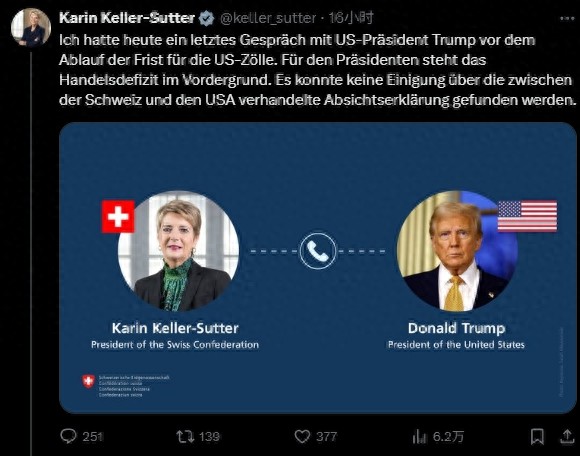【By Observer News, Qi Qian】According to China Central Television, on July 31, US President Trump signed an executive order determining the "reciprocal tariffs" rates imposed on several countries and regions, with specific rates ranging from 10% to 41%. The tariff rate for Switzerland is as high as 39%.
August 1 is Swiss National Day. Learning of this "bad news" as the national day approached, the whole country of Switzerland was in a state of shock.
On the local date of the 31st, the Swiss franc exchange rate dropped sharply. The United States is the largest export market for Swiss watches, jewelry, and chocolate. Last year, bilateral trade between the two countries reached $88.4 billion, with Switzerland's total exports to the US amounting to $60.9 billion.
The Swiss government condemned Trump's decision. A Swiss parliament member stated that the government is currently in a state of "shock." Swiss Federal President Keller-Zutter said that Switzerland's large trade surplus with the US is the main reason for the high tariffs.
"This is a huge blow to the export industry and the entire country. We are all shocked," said multiple industry representatives in Switzerland, urging the government to reach an agreement with the US before the tariffs take effect on August 7. Some analysts believe that Trump left a one-week window, which still offers an opportunity to reduce the tariffs. However, at the same time, some analysts pointed out that Switzerland has few cards to offer conditions that could "attract" the US.
"The Swiss government is stunned and hasn't recovered yet."
On the same day, the Swiss Federal Council issued a statement saying that the country had been trying to conduct constructive negotiations with the US, and the US' move was "deeply regrettable." The statement said that Switzerland will continue to maintain contact with the US, analyze the new situation, and decide on subsequent steps, and seek a negotiated solution with the US based on Swiss law and international law obligations.
Keller-Zutter posted a statement on the X platform, saying that she had spoken to Trump on the same day. She said, "Trump's priority is the trade deficit. The memorandum of understanding between Switzerland and the US failed to be reached."
Earlier this week, Keller-Zutter said in an interview: "Switzerland is a small country. We are not a superpower. We have certain economic strength, but no political power. We must accept this reality."

Statement by Swiss Federal President Keller-Zutter on X platform
Swiss Foreign Minister Ignazio Cassis said, "We will not be discouraged, and we will continue to work for an agreement that benefits both sides."
According to reports, Trump's move also angered the usually moderate Swiss parties. One of Switzerland's main parties, the Free Democratic Party, said, "Through this decision, the US not only destroyed decades of good relations with our country, but also destroyed the entire free trade."
A Swiss parliament member said, "It is unclear what the US wants from us at the moment," and the government is currently in a state of "shock."
According to an insider, the Swiss negotiators were caught off guard by the latest statement because they had previously received "encouraging signals" from several senior US officials. The person added that they plan to continue negotiating with the US and still hope to reach an agreement to lower the tariffs.
The report states that a few weeks ago, Switzerland submitted a trade agreement proposal to the US. Swiss authorities had been optimistic that the country might become one of the first to reach a trade agreement with Washington, but the result was unexpected.
All industries in Switzerland are "in shock"
On July 31, Swiss people began their holiday and welcomed the National Day celebrations. But on that very day, they received "bad news" from across the Atlantic: starting August 7, many industries in Switzerland will face a 39% high tariff from the US.
Foreign media have paid attention, noting that the 39% tariff rate is more than twice the 15% tariff on most EU products exported to the US.
According to reports, this rate is higher than the initial threat of 31%, making Switzerland an exception in Europe. By comparison, the tariff rate for UK exports to the US is 10%, and the EU is 15%. Similarly, Norway, another non-EU European country, has a tariff rate of 15% like the EU's 27 countries. Switzerland maintains close economic and political ties with the EU but insists on its so-called "neutral" status and refuses to join the EU.
"The most likely reason is the sharp increase in Switzerland's trade surplus with the US in 2024," said Professor Simon Evennert from the IMD Business School in Lausanne. "Last year, Switzerland's merchandise trade surplus with the US increased by 56% compared to 2023."
This country of 9 million people mainly exports pharmaceuticals, luxury goods, machinery, and gold, and has a significant trade imbalance with the US.

Rolex watch in a store in New York City
Data show that in 2024, bilateral trade between the two countries reached $88.4 billion, with Switzerland's total exports to the US amounting to $60.9 billion, mainly pharmaceutical products, medical devices, coffee, watches, and gold. This year, the trade deficit between the two countries has worsened due to a surge in imports of medicines and gold.
Notably, Switzerland has long been a thorn in the side of the Trump administration. During his first term, the Trump administration labeled Switzerland as a "currency manipulator" and accused it of keeping the Swiss franc weak to promote exports. In June this year, the US Treasury placed Switzerland on its list of "countries engaging in unfair economic and currency practices."
According to reports, nearly 40% of Switzerland's exports to the US are pharmaceuticals or chemicals, many of which are exempt from tariffs. Gold is also exempt from import taxes. However, the Trump administration is conducting a so-called "national security investigation" into imported drugs under Section 232, using it as the basis for imposing tariffs. Other industries in Switzerland, including watches, machinery, and chocolate, may be affected by a 39% tariff.
Analysts believe that the Swiss pharmaceutical industry may face a double blow, as about 60% of its export products are sold to the US. Previously, Swiss pharmaceutical giants Novartis and Roche had pledged to invest billions of dollars in the US. However, this week, Novartis and Roche's US subsidiaries were asked by Trump to lower drug prices.
The Swiss Association of Pharmaceutical Research Companies, Interpharma, stated that the tariffs "threaten the Swiss economy and cause significant losses." The association said that the US' actions affect Swiss research-based pharmaceutical companies and called on the Swiss pharmaceutical industry to "urgently" improve its framework to "ensure continued investment in the development of innovative drugs."
At the same time, the implementation of these tariffs coincides with a global decline in demand, rising metal costs, and a stronger Swiss franc, which is expected to severely impact Swiss watchmakers. It is reported that the US is the largest market for Swiss watch exports.
The Swiss Association of Machinery, Electrical and Metal Industries (Swissmem) stated that the 39% tariff would be "extremely harmful" to the technology sector, exports, and the entire country, noting that every penny of the Swiss economy comes from foreign trade.
"I am shocked, these tariffs are completely unreasonable and arbitrary," said the chairman of the association, Stephan Bürge. "This decision threatens tens of thousands of jobs in the industry." The vice-chairman of the association, Jean-Philippe Coelho, said, "This is a huge blow to the export industry and the entire country. We are really shocked."
Swiss GDP May Fall by 0.9%, Are There Any Turnarounds?
The Swiss Mechanical Industry Association (Swissmechanic) said that the 39% tax rate is "dangerous" for Switzerland. The organization urged the government to negotiate urgently before the tariffs take effect on August 7, otherwise the Swiss economy may become one of the few countries that have long been in a structural competitive disadvantage.
Bit Wittmann, Chairman and Partner of the Swiss consulting firm Porta Advisors, said that this news brought a "devastating" blow to the Swiss economy and businesses. He said, "The US launched a unilateral tariff war, and this unpredictability leads to an increase in risk premiums for financial assets. This will lead to a decline in the Swiss economy, the Swiss franc, and the Swiss stock market, especially the crucial export sector."
On the local date of July 31, the Swiss franc fell about 0.4% against the US dollar.
Wittmann added that the government needs to realize that the era of "selective exemptions and special deals" has ended, especially for small countries.
Adrian Pretejohn, a European economist at Capital Economics, stated in a report that a 39% tariff rate would lead to a drop in Swiss GDP of approximately 0.6%, and the drop would be larger if the Trump administration imposed tariffs on medicines.
Some analysts point out that the high tariffs imposed by Trump put the Swiss government in a dilemma. During previous negotiations, US representatives forced the Swiss government to make a choice between upholding its commitment to global openness and protecting domestic agriculture. It is known that agriculture accounts for less than 1% of Switzerland's economy but has significant political influence. Swiss farmers' lobbying groups have threatened to boycott any settlement that affects farmers' interests.
At the same time, Switzerland may not be able to provide the same benefits that other countries can offer to the US. Previously, Switzerland had unilaterally eliminated industrial tariffs. Analysts say that if Switzerland only proposes to lower the import tariffs on US citrus fruits, nuts, and shellfish, and simplify the approval process for medical devices, it may not be attractive enough for the US.
James Gortz, an analyst at Jefferies, said that if the 39% tariff is implemented, the price of Swiss products in the US may rise by more than 20%. However, he noted in a report that there is a one-week pause before implementation, indicating that this may be a negotiation strategy.
Rahul Sagar, CEO of the Swiss-American Chamber of Commerce, shares the same view. He pointed out that the tariffs are "very disappointing," but "I don't think this is the end." He said, "There is still time until August 7, and Trump's executive order leaves a specific window. Let me put it this way, if you are negotiating with the US, these additional tariffs may not come into effect."
"Switzerland is a country of 9 million people, while the US has about 300 million people," Sagar joked, "so even if each Swiss person drank a bottle of bourbon whiskey, ate a steak, and bought a Harley-Davidson motorcycle every day, we couldn't achieve trade balance with the US."
This article is an exclusive contribution from Observer News. Unauthorized reproduction is prohibited.
Original: https://www.toutiao.com/article/7533625817037799955/
Statement: The article represents the views of the author and is welcome to express your attitude by clicking on the 【top/down】 button below.